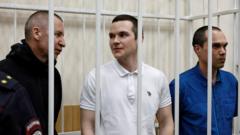In a notable escalation of the Russian government's crackdown on dissent, three lawyers representing the late opposition leader Alexei Navalny have been sentenced to prison terms of up to five-and-a-half years. Vadim Kobzev, Igor Sergunin, and Alexei Liptser were convicted on charges of participating in an "extremist organisation," a label attached to Navalny's Anti-Corruption Foundation, which was banned by a Russian court following Navalny's 2021 detention.
The lawyers were apprehended in October 2023, within a context of mounting pressure on Navalny, who died in February 2024 while imprisoned in an Arctic penal colony. The judicial proceedings against them occurred behind closed doors in Petushki, east of Moscow, raising concerns about transparency and fairness. The charges stemmed from accusations that the lawyers facilitated communication between Navalny and his associates, leveraging their professional status.
Reports indicate that Sergunin was the only lawyer to acknowledge the charges levied against them and consequently received a comparatively lenient sentence of three-and-a-half years. The other two, Liptser and Kobzev, received five and five-and-a-half years, respectively, despite their lawyers asserting that the evidence against them violated strict legal protections regarding lawyer-client confidentiality typically upheld in Russian law.
Following the court's decision, both Liptser and Kobzev's legal representatives expressed dismay at the verdict, labeling it unjust and a blatant suppression of legal rights within the country. Navalny had characterized the legal actions against his defense team as reminiscent of Soviet-era repression, reflecting what many observers deem a significant erosion of the rule of law.
The timing of their sentencing coincides directly with the anniversary of Navalny's own arrest in 2021, signaling a coordinated effort by the authorities to diminish his political legacy and target those associated with him. The legal team, including lawyers who have since fled Russia, criticized the harshness of the sentences, underscoring the broader implications for legal representation and the defense of civil rights in Russia.
Amnesty International weighed in, arguing that the actions against the lawyers are indicative of a broader trend aimed at dismantling the remaining vestiges of judicial rights and legal defense services in the country. Yulia Navalnaya, Navalny's widow, characterized the lawyers as political prisoners deserving of immediate release, echoing calls from human rights advocates around the globe for the Russian government to respect legal protections and uphold justice.
As the political landscape in Russia remains fraught with tension, the treatment of Navalny's lawyers highlights the precarious situation facing those who dare to advocate for dissent and challenge the the ruling authorities.
The lawyers were apprehended in October 2023, within a context of mounting pressure on Navalny, who died in February 2024 while imprisoned in an Arctic penal colony. The judicial proceedings against them occurred behind closed doors in Petushki, east of Moscow, raising concerns about transparency and fairness. The charges stemmed from accusations that the lawyers facilitated communication between Navalny and his associates, leveraging their professional status.
Reports indicate that Sergunin was the only lawyer to acknowledge the charges levied against them and consequently received a comparatively lenient sentence of three-and-a-half years. The other two, Liptser and Kobzev, received five and five-and-a-half years, respectively, despite their lawyers asserting that the evidence against them violated strict legal protections regarding lawyer-client confidentiality typically upheld in Russian law.
Following the court's decision, both Liptser and Kobzev's legal representatives expressed dismay at the verdict, labeling it unjust and a blatant suppression of legal rights within the country. Navalny had characterized the legal actions against his defense team as reminiscent of Soviet-era repression, reflecting what many observers deem a significant erosion of the rule of law.
The timing of their sentencing coincides directly with the anniversary of Navalny's own arrest in 2021, signaling a coordinated effort by the authorities to diminish his political legacy and target those associated with him. The legal team, including lawyers who have since fled Russia, criticized the harshness of the sentences, underscoring the broader implications for legal representation and the defense of civil rights in Russia.
Amnesty International weighed in, arguing that the actions against the lawyers are indicative of a broader trend aimed at dismantling the remaining vestiges of judicial rights and legal defense services in the country. Yulia Navalnaya, Navalny's widow, characterized the lawyers as political prisoners deserving of immediate release, echoing calls from human rights advocates around the globe for the Russian government to respect legal protections and uphold justice.
As the political landscape in Russia remains fraught with tension, the treatment of Navalny's lawyers highlights the precarious situation facing those who dare to advocate for dissent and challenge the the ruling authorities.



















